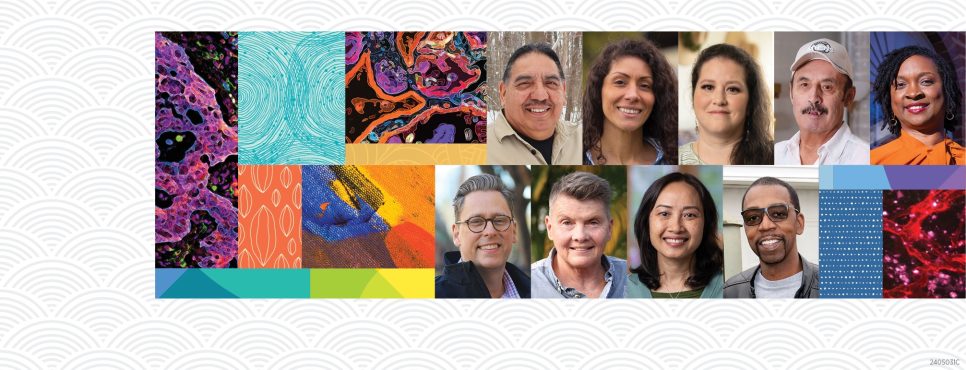The American Association for Cancer Research has been a longtime leader in advancing the science of cancer health disparities. As our core values include diversity, equity, inclusion, and belonging, the AACR is deeply committed to achieving the bold vision of cancer health equity for all:
Cancer Health Disparities
AACR programs and initiatives help to identify, quantify, and understand the causes of cancer health disparities, which is critical to the development and implementation of strategies to eliminate them. These efforts include cataloging ancestry-related differences in cancer biology to unlock the potential of precision medicine. Since its launch in 2007, the AACR Conference on the Science of Cancer Health Disparities has been the touchstone event for the cancer health equity research community.
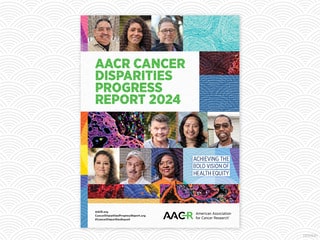
- AACR Cancer Disparities Progress Report 2024. The third edition of this trailblazing report, released in May 2024, outlines the complex socioeconomic, cultural, and environmental factors that drive and perpetuate cancer health disparities.

- AACR Conference on The Science of Cancer Health Disparities in Racial/Ethnic Minorities and the Medically Underserved. The 17th edition of this conference, which took place September 21-24 in Los Angeles, California, highlighted the latest science behind inequities in cancer incidence and mortality. The AACR featured the conference on its blog, Cancer Research Catalyst:
- Blog: Structural Racism and Cancer Disparities—Looking at All the Angles. Conference cochair Melissa B. Davis, PhD (right), of Morehouse School of Medicine, is the leader of team SAMBAI (Societal, Ancestry, Molecular, and Biological Analyses of Inequalities), a research project funded by a CRUK-NCI Cancer Grand Challenges grant that is focused on decoding the factors that cause and influence disparate cancer outcomes in underserved populations of African descent. She opened the conference with a keynote address that explored how structural racism impacts health inequities. She noted that increasing our understanding of how structural racism impacts biology and diversifying patient cohorts are critical to delivering on the promise of precision medicine for all populations.
The theme of structural racism was woven throughout the conference. In a plenary session on the topic, Lauren Barber, PhD, outlined how structural racism is based on multiple systems and institutions that interact to shape factors like education, employment, housing, health care, political participation, and criminal justice—all of which can impact the health of racial minorities. In a companion session, conference cochair Adana A. M. Llanos, PhD, MPH, explained how a combination of neighborhood disinvestment, racial residential segregation, and the lived experiences of being Black in America can contribute to stress responses that trigger inflammation that could have a negative molecular impact on cells. - Blog: The Affordable Care Act’s Impact on Access to Cancer Care. Access to insurance is an important factor in whether a person receives guideline-concordant cancer care, which is associated with improved outcomes, including survival. Ten years after the launch of the ACA Health Insurance Marketplace—which helped reduce the rate of Americans of all ages without health insurance from 14.4% to 7.7%—third-year medical student Sriya Kudaravalli and her colleagues investigated whether this coverage expansion led to better cancer care for people across socioeconomic dimensions. Over the course of the study period, they found the receipt of guideline-concordant care increased after the implementation of the ACA on average per year for non-white patients (7.8%), those in rural areas (7.7%), and those in disadvantaged neighborhoods (3.5%).
- Blog: Sexual Symptoms and Treatment Adherence After Breast Cancer. Patients diagnosed with early-stage, hormone receptor-positive breast cancer are commonly prescribed a post-surgical regimen of adjuvant endocrine therapy (AET), which prevents recurrence by blocking the effects of estrogen. While the treatment has proven quite effective, side effects cause over a third of patients to discontinue their AET prematurely. Janeane N. Anderson, PhD, MPH, presented a study showing that Black and white patients experience these sexual symptoms differently, and it impacts their lives and medication adherence in different ways. Dr. Anderson noted that interventions exist to treat these sexual health symptoms, and that open communication with patients about their sexual health needs can help more of them maintain their treatment adherence and improve their outcomes.
- Blog: Structural Racism and Cancer Disparities—Looking at All the Angles. Conference cochair Melissa B. Davis, PhD (right), of Morehouse School of Medicine, is the leader of team SAMBAI (Societal, Ancestry, Molecular, and Biological Analyses of Inequalities), a research project funded by a CRUK-NCI Cancer Grand Challenges grant that is focused on decoding the factors that cause and influence disparate cancer outcomes in underserved populations of African descent. She opened the conference with a keynote address that explored how structural racism impacts health inequities. She noted that increasing our understanding of how structural racism impacts biology and diversifying patient cohorts are critical to delivering on the promise of precision medicine for all populations.

- AACR Annual Meeting 2024. The Annual Meeting featured a robust Cancer Disparities track consisting of 18 sessions that addressed various aspects of cancer health equity, including the following:
- Plenary Session: Artificial Intelligence at the Interface. Anant Madabhushi, PhD, discussed the emergence of digital pathology, which uses AI to assess tissue histology slides and predict cancer risk for patients. The technology could mitigate the lack of trained pathologists in low-and middle-income countries (LMICs), enhancing screening and improving outcomes in those regions.
- Technology-Driven Progress in LMICs. The Annual Meeting educational program featured a methods workshop on “Applying Technologies to Build Capacity in Low- and Middle-income Countries.” Kojo S.J. Elenitoba-Johnson, MD, Ayman Mohamed, MD, and Dianna Ng, MD, discussed novel uses of technology to expand cancer care in under-resourced settings.
- Molecular Profiling in Breast Cancer and Racial/Ethnic Minorities. AACR Fellow John D. Carpten, PhD, FAACR, chaired this Advances in the Science of Cancer Disparities Session, which addressed genetic and genomic features of breast cancers in diverse cohorts and disparities in breast cancer biomarker testing that can impact treatment decisions. The session was dedicated to the Memory of Edith P. Mitchell, a trailblazing oncologist who devoted her illustrious career to improving outcomes for cancer patients, particularly those from underrepresented populations.
- AACR Project GENIE. This international cancer registry of real-world data can provide insights into the biological and genetic factors that are associated with cancer in racial and ethnic minorities.

- AACR Distinguished Lectureship on the Science of Cancer Health Disparities. Established in 2010, this award honors an investigator whose novel and significant work has had or may have a far-reaching impact on the etiology, detection, diagnosis, treatment or prevention of cancer health disparities. The 2024 recipient, Scarlett Lin Gomez, MPH, PhD (right), was honored for her innovative research dedicated to ascertaining the impact of various social determinants of health—including discrimination, immigration-related stress, and contemporary redlining and racial bias in mortgage lending—on cancer disparities. She delivered her lecture during the opening session of the 17th AACR Conference on The Science of Cancer Health Disparities (see above).
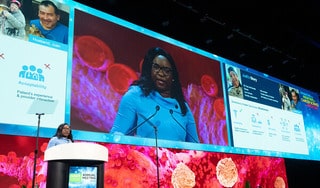
- AACR Annual Meeting 2023: Centering Equity. The opening plenary session of the AACR Annual Meeting 2023, which took place April 14-19 in Orlando, Florida, showcased the work of social and molecular cancer epidemiologist Tomi Akinyemiju, PhD, who discussed “Centering equity at the frontiers of cancer care.”
- FDA-AACR Workshop To Examine Under-Representation of African Americans in Multiple Myeloma Clinical Trials. African Americans are disproportionately affected by multiple myeloma, having a two- to three-fold higher incidence of multiple myeloma compared with whites. Despite this difference in incidence, African Americans have historically been underrepresented in clinical trials for multiple myeloma therapies. In February 2020, AACR Fellow Kenneth C. Anderson, MD, joined the FDA’s Lola A. Fashoyin-Aje, MD, MPH, Nicole J. Gormley, MD, and Paul G. Kluetz, MD to cochair a workshop to address this disparity.
The goals of the workshop were to discuss the biology and genetics underlying racial and ethnic differences in multiple myeloma; characterize racial and ethnic data available from multiple myeloma registrational trials and real-world data sources; address the challenge of limited clinical data in racial and ethnic minorities with multiple myeloma; and improve understanding of the safety and efficacy of anti-myeloma therapeutics in racial and ethnic minorities. - AACR Scientific Journals. The AACR’s ten scientific journals publish the latest research on the science of cancer health disparities.
Diversity, Equity, Inclusion, and BElonging
Through education, training, and research funding, the AACR works to ensure that the cancer health care workforce reflects the community it serves. In addition, AACR programs and initiatives examine the structural and systemic biases in the cancer research enterprise and work to eliminate them.

- AACR Constituency Groups. Minorities in Cancer Research (MICR) (founded in 2000) and Women in Cancer Research (WICR) (founded in 1988) are AACR membership groups that are committed to meeting the professional needs and fostering the career development of minority and women scientists, respectively.
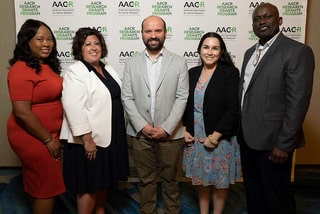
- Funding Meritorious Underrepresented Investigators. The AACR Grants Program has taken significant steps to diversify the cancer workforce by funding meritorious scientists from diverse backgrounds that are underrepresented in the cancer research community—including women, individuals working in low- and middle-income countries, and members of racial or ethnic minorities. A total of 25 grants supporting diversity, equity, and inclusion totaling more than $6.38 million were awarded in 2023, launching the careers of promising researchers that will drive progress against cancer for all communities.

- Task Force on Eliminating Racial Inequities in Cancer Research. John M. Carethers, MD, MACP, and Melissa B. Davis, PhD, chair this Task Force, which was established in 2021.

- Robert A. Winn Diversity in Clinical Trials: Design and Implementation of Clinical Trials Workshop in Partnership with the AACR. Established in 2021, the Robert A. Winn Diversity in Clinical Trials Award Program is implemented by the AACR and Virginia Commonwealth University and funded by the Bristol Myers Squibb Foundation to train 250 community-oriented clinical trial investigators by 2025. As part of the program, the AACR organizes an annual workshop on excellence in clinical trial implementation.

- Advancing the Careers of Minority Faculty. For more than 25 years—and with the generous support of the NCI CRCHD—the AACR has offered grants to facilitate the participation in its Annual Meeting of full-time minority faculty members and faculty members of Minority-Serving Institutions. In 2024, a total of 64 minority investigators working at the level of assistant professor or above received either an AACR Minority Scholar Award or a Minority-serving Institution Faculty Scholar in Cancer Research Award. The program provides the education and training needed to sustain and diversify the pipeline of cancer scientists.
World Cancer Research Day. The theme of World Cancer Research Day 2024 was “Innovation in Cancer Research Drives Progress Toward Health Equity.” The date (September 24) coincided with the final day of the AACR Conference on The Science of Cancer Health Disparities in Racial/Ethnic Minorities and the Medically Underserved. The AACR marked the occasion by convening a panel of experts in global health equity to address this topic at the conference. Brian Rivers, PhD, MPH, director of the Cancer Health Equity Institute at Morehouse School of Medicine, moderated the session, which featured researchers Simone Badal, PhD, MBA, and Karen M. Winkfield, MD, PhD, as well as three-time cancer survivor and patient advocate Susan Matsuko Shinagawa. The session was highlighted on the AACR blog, and the complete panel discussion video is available for viewing below:
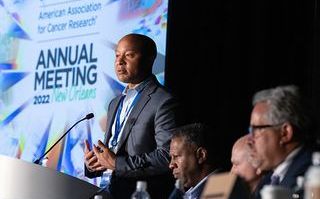
- AACR Annual Meeting 2022: Dismantling Systemic Racism. An MICR Forum discussed models, methods, and outcomes that cancer centers should consider while working to create anti-racist environments.
- Alleviating the Cancer Burden in Africa by Building Research Capacity. The Beginning Investigator Grant for Catalytic Research (BIG Cat) is an ongoing initiative to build capacity for cancer research in Africa. Initially founded in 2010 by the African Organization for Research and Training in Cancer (AORTIC) in collaboration with the U.S. National Cancer Institute (NCI) Center for Global Health (CGH), BIG Cat grants support two-year cancer research projects conducted by early-career investigators in Africa. In 2022, the AACR joined the collaboration to administer future cohorts of BIG Cat awards, made possible through the generous support of Takeda Oncology. The first BIG Cat grants were awarded to four African researchers in January 2023.
Patient Advocacy and Policy
The AACR catalyzes progress toward health equity by disseminating critical information to legislators, regulators, and the cancer community and calling for action on policies that can improve public health.

- Patient Advocates at the Cancer Health Disparities Conference. During the 17th AACR Conference on the Science of Cancer Health Disparities in late September, patient advocates actively participated in the program as speakers, panelists, and attendees:
- Patient Advocate Keynote. Ricki Fairley, a survivor of stage 3a triple-negative breast cancer and the CEO of TOUCH, The Black Breast Cancer Alliance delivered the advocate keynote address. She highlighted an ongoing crisis in cancer care: that Black women with breast cancer have a 41% higher mortality rate, a 39% higher recurrence rate, and a 71% higher relative risk of death compared to white women; and that 90% of the clinical trials that supported the approval of 82 novel therapeutics between 2015 and 2021 lacked adequate representation from Black patients. Through projects like the When We Tri(al) campaign, Ms. Fairley has signed up nearly 20,000 Black women to participate in clinical trials.
- Advocate Sessions. In a special session titled “Advocacy at the Bench: Diverse Voices of Cancer Survivorship,” Kimlin Tan Ashing, PhD, moderated a panel discussion during which five patient advocates provided practical insights on how the research community can optimize patient engagement in cancer research.
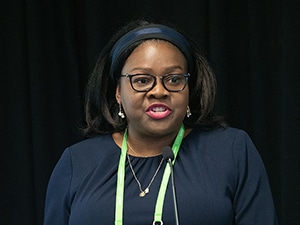
- AACR Annual Meeting 2023: Developing and Implementing Diversity Action Plans. On April 13, 2022, the FDA released a draft guidance on diversity action plans to improve enrollment of participants from underrepresented racial and ethnic populations in clinical trials. In response to the draft, the AACR convened three workshops for leaders of oncology therapeutics companies to discuss best practices for integrating diversity action plans into their clinical development strategies. The workshops were led by Lola Fashoyin-Aje, MD, MPH, the program lead for Project Equity, an initiative from the FDA Oncology Center of Excellence (OCE).
At the AACR Annual Meeting 2023, Dr. Fashoyin-Aje moderated a symposium on “Implementing Diversity Action Plans for Clinical Trials” that addressed the challenges and opportunities facing drug developers who develop and implement diversity action plans. - Congressional Briefing: AACR Cancer Disparities Progress Report 2024. On May 15, 2024, the AACR hosted a Congressional briefing to release the third edition of the AACR Cancer Disparities Progress Report. Developed as a resource for policy makers and legislators, the report highlights the progress being made toward cancer health equity and the ongoing need for a multidisciplinary and collaborative approach—including robust federal funding—to address this complex and multifactorial public health issue.

- Op-Ed: “How to Reduce Racial Disparities in Cancer.” On April 12, 2022, AACR board member John D. Carpten, PhD, FAACR (near right), collaborated with Kathy Giusti (far right), the founder and chief mission officer of the Multiple Myeloma Research Foundation, to write an op-ed in The Hill that recommended a unique approach to eradicating cancer disparities. The article—which summarized the conclusions derived during a policy session on “Reducing Disparities and Democratizing Cancer Care” at the AACR Annual Meeting 2022—calls for collective action through a public-private partnership led by the Foundation for the National Institutes of Health and supported by the Cancer Moonshot initiative that improves access to trials and treatments for all patients with cancer.

- AACR Journals: Calls for Action. AACR journals provide a forum for perspectives on and recommendations for addressing cancer health disparities, including the following:
- Black in Cancer: Championing Diversity in Cancer Research and Medicine. In February 2020, Cancer Discovery published this article profiling Black in Cancer, a group founded that year to amplify Black voices in the cancer workforce. Authors and cofounders Henry J. Henderson III, PhD, and Sigourney Bell detailed their efforts to help build a strong pipeline of Black doctors and researchers, ultimately diversifying the workforce and improving health outcomes.
- The Race toward Equity: Increasing Racial Diversity in Cancer Research and Cancer Care. In August 2020, Cancer Discovery published this commentary by Donita C. Brady, PhD, of the University of Pennsylvania and Ashani T. Weeraratna, PhD, of Johns Hopkins University, suggesting concrete steps cancer institutions can take to improve diversity and racial equity among students, faculty, and patients.
- Eliminating Racial Disparities in Multiple Myeloma Therapies. In March 2021, Blood Cancer Discovery published this paper, which made recommendations for increasing the representation of Blacks in clinical trials for multiple myeloma. The recommendations, detailed by lead author Kenneth C. Anderson, MD, FAACR, of the Dana-Farber Cancer Institute, were developed at a workshop convened by the AACR and the U.S. Food and Drug Administration.
- Genomics and Cancer Disparities: The Justice and Power of Inclusion. The 10th Anniversary issue of Cancer Discovery published in April 2021 included this commentary by Melissa B. Davis of Weill Cornell Medicine that called on the cancer community to translate genomic research to benefit underserved populations.
- Enrollment Matters: The Reality of Disparity and Pursuit of Equity in Clinical Trials. In June 2022, Cancer Discovery published this Science in Society commentary by Robert A. Winn, director of the Virginia Commonwealth University Massey Cancer Center. Dr. Winn highlighted the enduring disparities in clinical trial enrollment and called upon the scientific community deconstruct and reconstruct the paradigms that perpetuate them.
